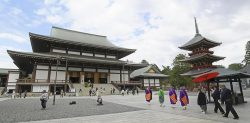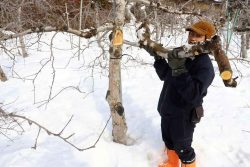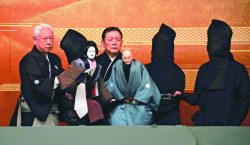Yoon Takes ‘Responsibility’ as President to Resolve Wartime Requisitioned Workers Issue with Japan
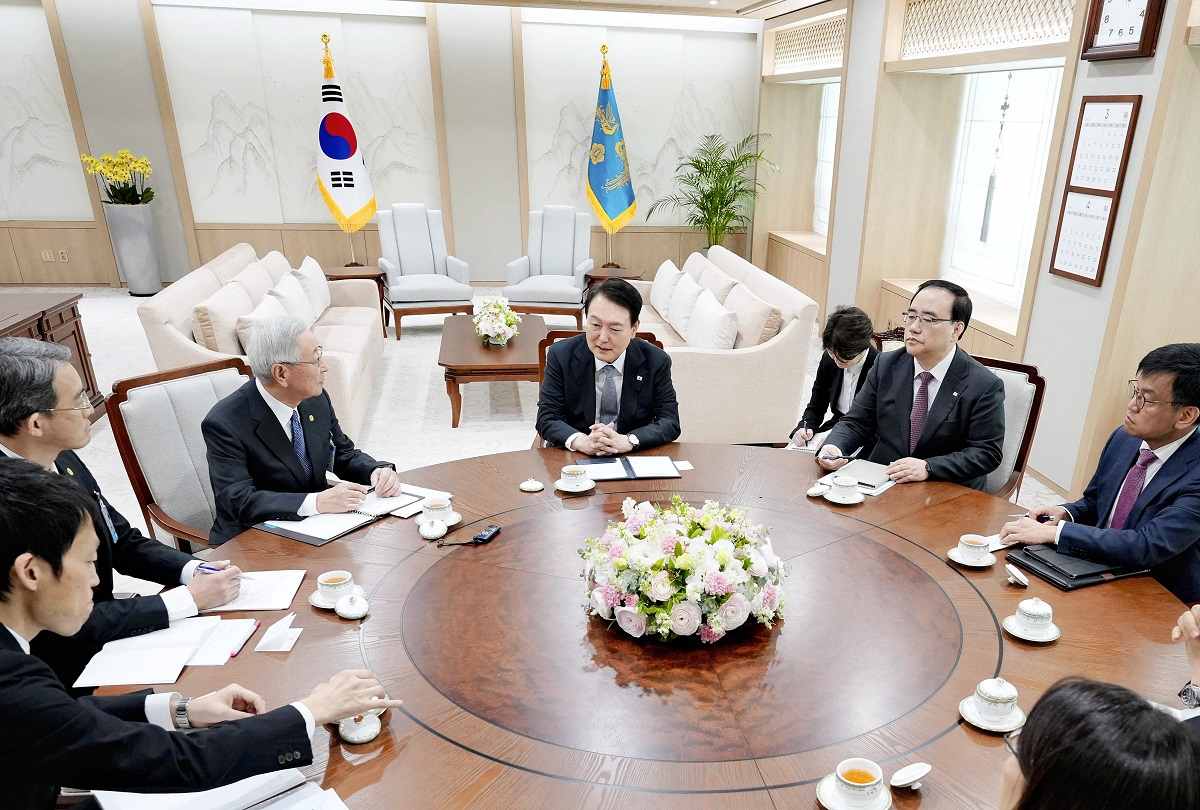
South Korean President Yoon Suk Yeol, center, speaks during an interview with The Yomiuri Shimbun in the presidential office in Seoul on Tuesday morning.
15:40 JST, March 15, 2023
South Korean President Yoon Suk Yeol, in an exclusive interview with The Yomiuri Shimbun on Tuesday, said that resolving the issue of lawsuits linked to former wartime requisitioned workers from the Korean Peninsula is his “responsibility” as president, manifesting his preparedness to improve relations between Japan and South Korea.
He also said that he had an idea for a solution even before he ran for the presidency, showing his eagerness to settle the issue.
Campaign pledge
Yoon said, “It was my campaign pledge to the people in the presidential election that I would definitely return the deteriorated relations between South Korea and Japan to normal, and even develop them further.”
In the first half of the interview, Yoon explained the background behind his decision to announce on March 6 a solution to the wartime requisitioned workers issue, despite an expected backlash within the country.
In 2018, the South Korean Supreme Court finalized a ruling that ordered Nippon Steel & Sumitomo Metal Corp., now Nippon Steel Corp., and Mitsubishi Heavy Industries, Ltd. to pay compensation. This created a serious contradiction with the 1965 Agreement on the Settlement of Problems concerning Property and Claims and on Economic Cooperation between the two countries, which explicitly states that the issue of compensation has been “settled completely and finally.”
Yoon said, “I have been considering that it is the government that must resolve the issue by exercising its wisdom.”
The South Korean government’s solution involves “third-party compensation,” in which a foundation under the umbrella of the government will pay the plaintiffs compensation equivalent to the amount the defendant Japanese companies have been ordered to pay.
In Japan, some express caution that the issue of former wartime requisitioned workers could be taken up again in South Korea in certain future circumstances, such a change in government.
Others have also pointed out that the foundation, which is to pay the plaintiffs the equivalent of compensation, can itself come to have a “right to claim compensation” from the Japanese companies, and may exercise this right in the future.
In response to such concerns on the Japanese side, Yoon indicated his view that the foundation would not come to exercise any right to seek compensation in the future, saying, “I believe that there is nothing to worry about.” If the foundation pays the plaintiffs an amount equivalent to the ordered compensation, “I think that will settle any further discussion,” he said.
Three plaintiffs in their 90s formally expressed on Monday their intention not to accept the compensation equivalent from the foundation.
But there are other plaintiffs who have expressed their willingness to accept it, leaving the plaintiffs divided in their responses.
Under the third-party reimbursement plan, even if the plaintiffs refuse to accept the money, the foundation can deposit the money with the court. The South Korean government decided on this approach after consulting legal experts.
Yoon’s remarks are seen as an indication that he is confident that this approach, through detailed procedures, can lead to a settlement while dispelling the concerns of the Japanese side.
Starting over
During the interview, Yoon called for returning bilateral relations to the normalcy of the “good old days,” apparently referring to the 1998 Japan-South Korea Joint Declaration, in which Japan expressed an apology for Japanese colonial rule and South Korea responded by saying that it would develop future-oriented relations with Japan.
One of Yoon’s aides explained that this is “his message to Japan to reaffirm the spirit of the Joint Declaration and build a new South Korea-Japan relationship.”
Meanwhile, Yoon refrained from referring to the timing of the resolution of pending issues affected by the requisitioned workers issue, such as normalizing the bilateral General Security of Military Information Agreement (GSOMIA), which allows Japan and South Korea to share defense intelligence.
According to his aide, Yoon “plans to first confirm the normalization of bilateral relations by his visit to Japan and then try to resolve the issues step by step.”
Related stories
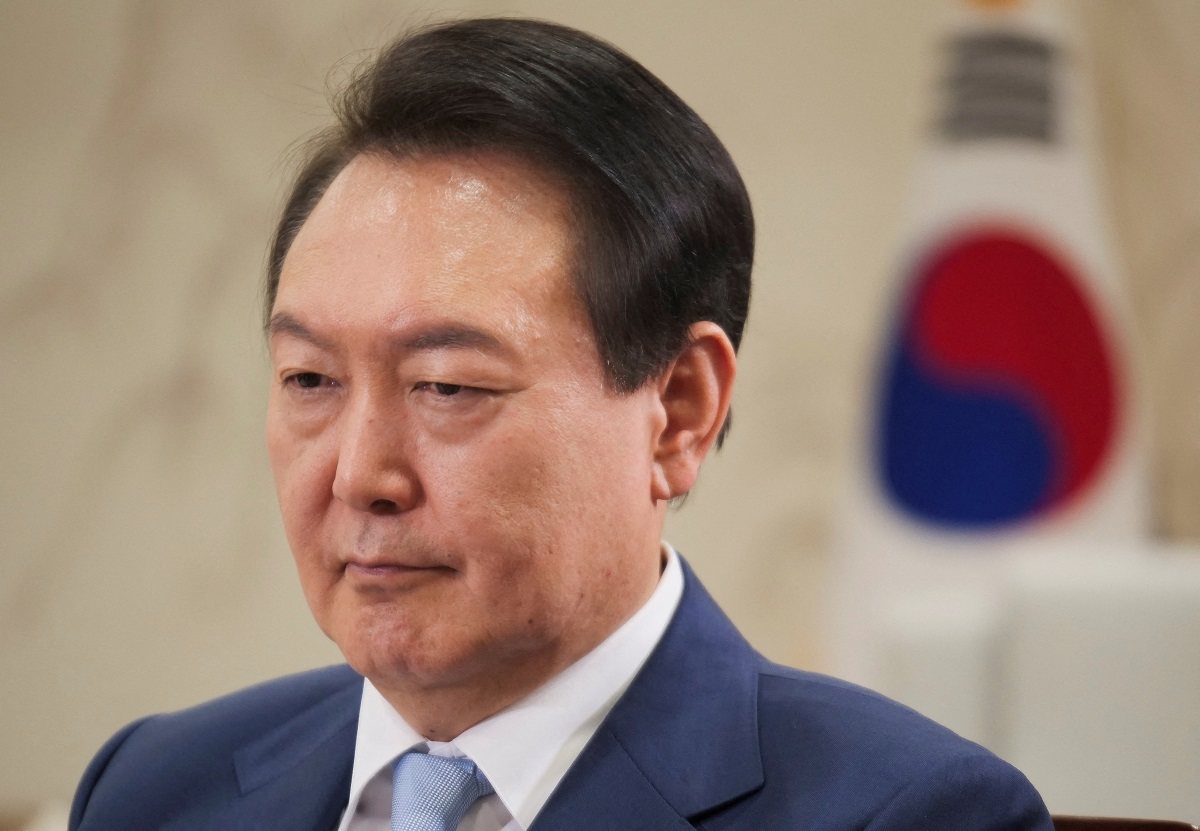
Yoon: Seoul Will Not Exploit Issues with Japan for Political Purposes
https://japannews.yomiuri.co.jp/world/asia-pacific/20230315-97450/Top Articles in World
-

Israeli Ambassador to Japan Speaks about Japan’s Role in the Reconstruction of Gaza
-

Videos Plagiarized, Reposted with False Subtitles Claiming ‘Ryukyu Belongs to China’; Anti-China False Information Also Posted in Japan
-

Nepal Bus Crash Kills 19 People, Injures 25 Including One Japanese National
-

China, India Tapping into Promising African Market; Beijing Announces Tariff Cuts, Both Countries Aim to Expand Exports
-

Ukrainian Ambassador Closely Watching Japan’s Revision of Defense Export Rules, Hopes for Future Arms Support
JN ACCESS RANKING
-

Producer Behind Pop Group XG Arrested for Cocaine Possession
-

Japan PM Takaichi’s Cabinet Resigns en Masse
-

Man Infected with Measles Reportedly Dined at Restaurant in Tokyo Station
-

Israeli Ambassador to Japan Speaks about Japan’s Role in the Reconstruction of Gaza
-

Videos Plagiarized, Reposted with False Subtitles Claiming ‘Ryukyu Belongs to China’; Anti-China False Information Also Posted in Japan









